关于灾难的高中英语作文
- 格式:docx
- 大小:18.28 KB
- 文档页数:2
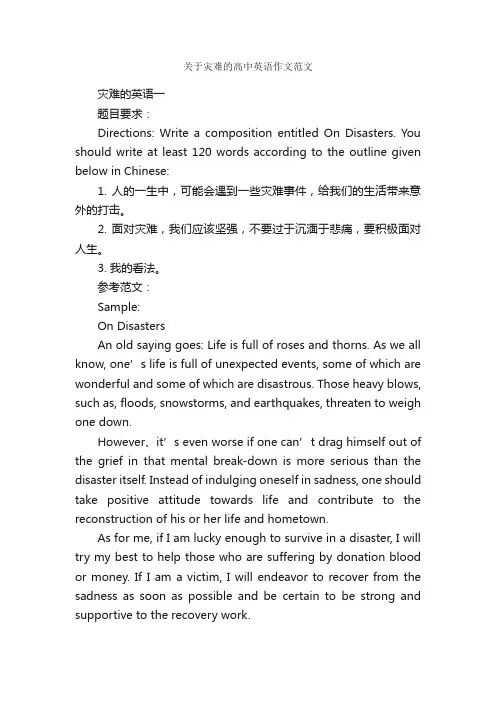
关于灾难的高中英语作文范文灾难的英语一题目要求:Directions: Write a composition entitled On Disasters. You should write at least 120 words according to the outline given below in Chinese:1. 人的一生中,可能会遇到一些灾难事件,给我们的生活带来意外的打击。
2. 面对灾难,我们应该坚强,不要过于沉湎于悲痛,要积极面对人生。
3. 我的看法。
参考范文:Sample:On DisastersAn old saying goes: Life is full of roses and thorns. As we all know, one’s life is full of unexpected events, some of which are wonderful and some of which are disastrous. Those heavy blows, such as, floods, snowstorms, and earthquakes, threaten to weigh one down.However、it’s even worse if one can’t drag himself out of the grief in that mental break-down is more serious than the disaster itself. Instead of indulging oneself in sadness, one should take positive attitude towards life and contribute to the reconstruction of his or her life and hometown.As for me, if I am lucky enough to survive in a disaster, I will try my best to help those who are suffering by donation blood or money. If I am a victim, I will endeavor to recover from the sadness as soon as possible and be certain to be strong and supportive to the recovery work.灾难的英语作文二What a disaster(灾难)!So far,it's reported that more than 60,000 people died in the SiChuan earthquake.What's more, millions of people there have become homeless.And they are still in the danger of illness and other difficulties. Anyway, thanks to all the kind people, in and abroad,the situation has been changing well.But we still work hard at it,especially to build houses for those homeless people and cure the injured people.What can we do now? Besides doing our own job well,we can donate money to them.We firmly believe that with the party and the government's strong leadership, and with the people of all nationalities throughout the country to aid,this earthquake relief will be a victory!【译文】灾难!到目前为止,有报道称,超过60,000人在四川地震中死亡,再加上数百万人民流离失所。
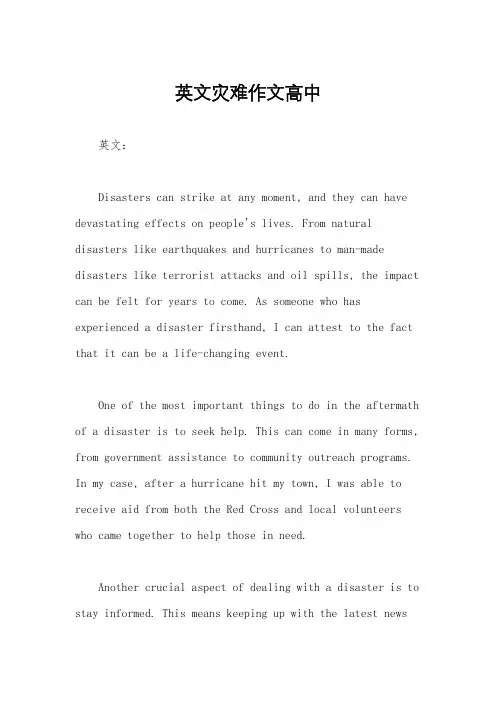
英文灾难作文高中英文:Disasters can strike at any moment, and they can have devastating effects on people's lives. From natural disasters like earthquakes and hurricanes to man-made disasters like terrorist attacks and oil spills, the impact can be felt for years to come. As someone who has experienced a disaster firsthand, I can attest to the fact that it can be a life-changing event.One of the most important things to do in the aftermath of a disaster is to seek help. This can come in many forms, from government assistance to community outreach programs. In my case, after a hurricane hit my town, I was able to receive aid from both the Red Cross and local volunteers who came together to help those in need.Another crucial aspect of dealing with a disaster is to stay informed. This means keeping up with the latest newsand updates about the situation, as well as being aware of any potential dangers or hazards. During the hurricane, I made sure to listen to the radio and check social media for updates on the storm's progress and any evacuation orders.Finally, it's important to remember that recovery takes time. It can be easy to feel overwhelmed and hopeless inthe aftermath of a disaster, but it's important to stay positive and focus on taking small steps towards rebuilding. In the case of my town, it took months for things to start feeling somewhat normal again, but with hard work and determination, we were able to rebuild and move forward.中文:灾难可能随时发生,对人们的生活造成毁灭性的影响。
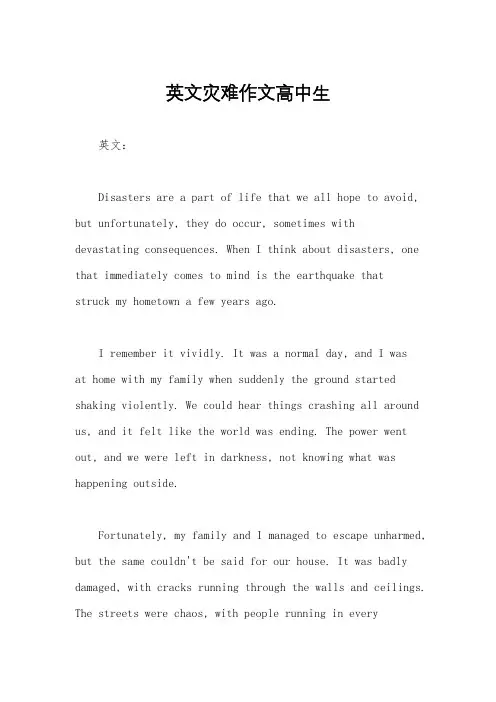
英文灾难作文高中生英文:Disasters are a part of life that we all hope to avoid, but unfortunately, they do occur, sometimes withdevastating consequences. When I think about disasters, one that immediately comes to mind is the earthquake thatstruck my hometown a few years ago.I remember it vividly. It was a normal day, and I wasat home with my family when suddenly the ground started shaking violently. We could hear things crashing all around us, and it felt like the world was ending. The power went out, and we were left in darkness, not knowing what was happening outside.Fortunately, my family and I managed to escape unharmed, but the same couldn't be said for our house. It was badly damaged, with cracks running through the walls and ceilings. The streets were chaos, with people running in everydirection, screaming and crying.In the aftermath of the earthquake, our community came together to help one another. Neighbors helped clear debris, shared food and water, and provided support to those whohad lost everything. It was heartwarming to see everyone rallying together in the face of such adversity.But the road to recovery was long and difficult. Ittook months to rebuild our house, and even longer for the emotional scars to heal. The experience taught me the importance of being prepared for disasters and cherishing the ones you love.中文:灾难是生活中不可避免的一部分,我们都希望能够避免,但不幸的是,它们确实会发生,有时会造成毁灭性的后果。
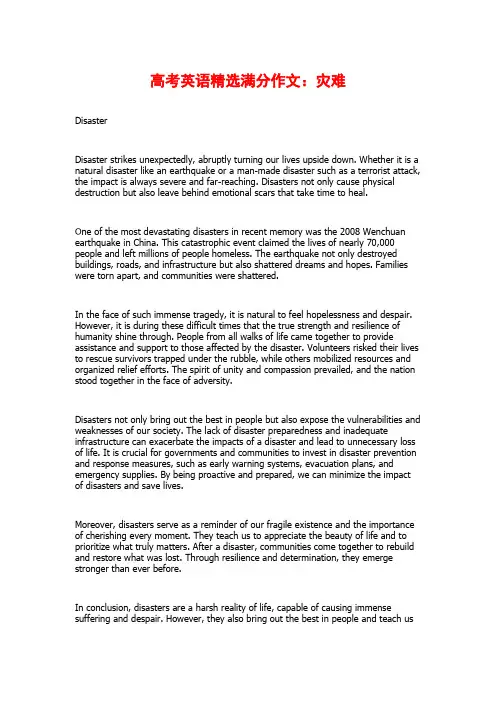
高考英语精选满分作文:灾难DisasterDisaster strikes unexpectedly, abruptly turning our lives upside down. Whether it is a natural disaster like an earthquake or a man-made disaster such as a terrorist attack, the impact is always severe and far-reaching. Disasters not only cause physical destruction but also leave behind emotional scars that take time to heal.One of the most devastating disasters in recent memory was the 2008 Wenchuan earthquake in China. This catastrophic event claimed the lives of nearly 70,000 people and left millions of people homeless. The earthquake not only destroyed buildings, roads, and infrastructure but also shattered dreams and hopes. Families were torn apart, and communities were shattered.In the face of such immense tragedy, it is natural to feel hopelessness and despair. However, it is during these difficult times that the true strength and resilience of humanity shine through. People from all walks of life came together to provide assistance and support to those affected by the disaster. Volunteers risked their lives to rescue survivors trapped under the rubble, while others mobilized resources and organized relief efforts. The spirit of unity and compassion prevailed, and the nation stood together in the face of adversity.Disasters not only bring out the best in people but also expose the vulnerabilities and weaknesses of our society. The lack of disaster preparedness and inadequate infrastructure can exacerbate the impacts of a disaster and lead to unnecessary loss of life. It is crucial for governments and communities to invest in disaster prevention and response measures, such as early warning systems, evacuation plans, and emergency supplies. By being proactive and prepared, we can minimize the impact of disasters and save lives.Moreover, disasters serve as a reminder of our fragile existence and the importance of cherishing every moment. They teach us to appreciate the beauty of life and to prioritize what truly matters. After a disaster, communities come together to rebuild and restore what was lost. Through resilience and determination, they emerge stronger than ever before.In conclusion, disasters are a harsh reality of life, capable of causing immense suffering and despair. However, they also bring out the best in people and teach usvaluable lessons about unity, compassion, and preparedness. By working together, we can overcome any disaster and build a brighter, more resilient future.。
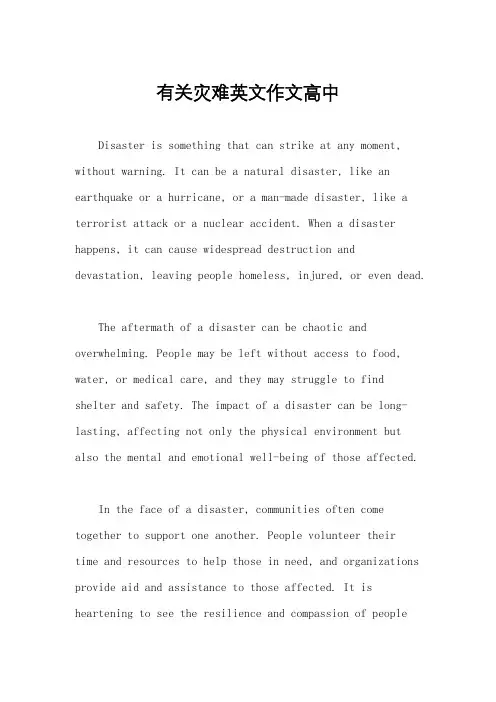
有关灾难英文作文高中Disaster is something that can strike at any moment, without warning. It can be a natural disaster, like an earthquake or a hurricane, or a man-made disaster, like a terrorist attack or a nuclear accident. When a disaster happens, it can cause widespread destruction and devastation, leaving people homeless, injured, or even dead.The aftermath of a disaster can be chaotic and overwhelming. People may be left without access to food, water, or medical care, and they may struggle to findshelter and safety. The impact of a disaster can be long-lasting, affecting not only the physical environment butalso the mental and emotional well-being of those affected.In the face of a disaster, communities often come together to support one another. People volunteer theirtime and resources to help those in need, and organizations provide aid and assistance to those affected. It is heartening to see the resilience and compassion of peoplein the wake of a disaster, as they work together to rebuild and recover.However, the road to recovery can be long and difficult. Rebuilding infrastructure, restoring services, andproviding support to those who have lost everything takes time and resources. It is important for governments and organizations to provide ongoing support to affected communities, to ensure that they can recover and rebuild in a sustainable way.Ultimately, the impact of a disaster can be far-reaching, affecting not only the immediate area but alsothe global community. It serves as a reminder of thefragility of life and the importance of preparedness and resilience. As we continue to face the challenges of a changing world, it is essential that we work together to mitigate the impact of disasters and support those who are affected.。
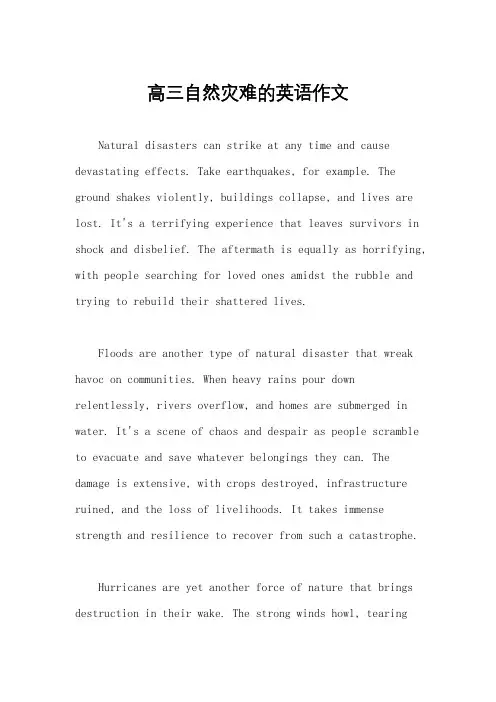
高三自然灾难的英语作文Natural disasters can strike at any time and cause devastating effects. Take earthquakes, for example. The ground shakes violently, buildings collapse, and lives are lost. It's a terrifying experience that leaves survivors in shock and disbelief. The aftermath is equally as horrifying, with people searching for loved ones amidst the rubble and trying to rebuild their shattered lives.Floods are another type of natural disaster that wreak havoc on communities. When heavy rains pour down relentlessly, rivers overflow, and homes are submerged in water. It's a scene of chaos and despair as people scramble to evacuate and save whatever belongings they can. The damage is extensive, with crops destroyed, infrastructure ruined, and the loss of livelihoods. It takes immense strength and resilience to recover from such a catastrophe.Hurricanes are yet another force of nature that brings destruction in their wake. The strong winds howl, tearingroofs off houses and uprooting trees. The torrential rain causes flooding, leaving streets impassable and homes uninhabitable. The aftermath is a landscape of devastation, with debris scattered everywhere and power lines down. It's a long and arduous process to rebuild and restore normalcy in the affected areas.Wildfires are a terrifying natural disaster that engulfs everything in its path. The raging flames consume forests, destroying habitats and displacing wildlife. The smoke fills the air, making it difficult to breathe and causing health hazards for those nearby. The efforts to contain and extinguish the fire are tireless, with firefighters risking their lives to save others. The scars left behind by wildfires are long-lasting, as it takes years for the ecosystem to recover.Tornadoes are a force of nature that strikes withlittle warning. The swirling winds pick up everything in their path, leaving destruction in their wake. Homes are torn apart, and lives are shattered. The aftermath is a scene of devastation, with debris scattered for miles andcommunities left in ruins. It takes time and resources to rebuild and heal from the trauma caused by a tornado.In conclusion, natural disasters are unpredictable and can cause immense damage and loss. Whether it's an earthquake, flood, hurricane, wildfire, or tornado, the impact is devastating. It's important for communities to come together and support each other during these difficult times. With resilience and determination, we can rebuild and recover, but the scars left behind will always remind us of the power of nature.。
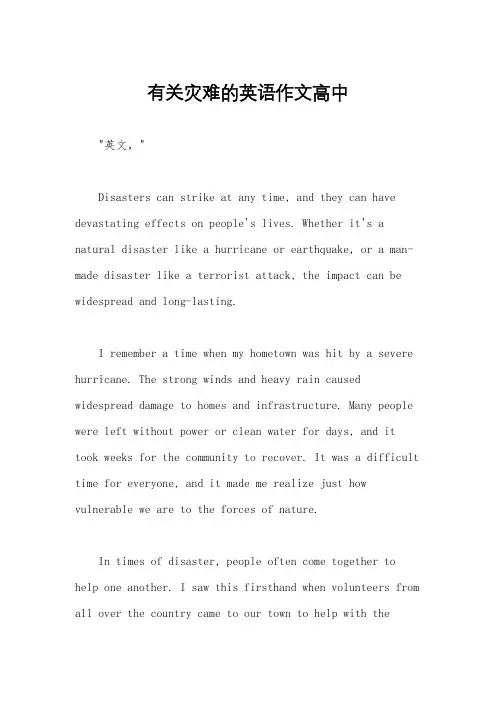
有关灾难的英语作文高中"英文,"Disasters can strike at any time, and they can have devastating effects on people's lives. Whether it's a natural disaster like a hurricane or earthquake, or a man-made disaster like a terrorist attack, the impact can be widespread and long-lasting.I remember a time when my hometown was hit by a severe hurricane. The strong winds and heavy rain caused widespread damage to homes and infrastructure. Many people were left without power or clean water for days, and it took weeks for the community to recover. It was a difficult time for everyone, and it made me realize just how vulnerable we are to the forces of nature.In times of disaster, people often come together to help one another. I saw this firsthand when volunteers from all over the country came to our town to help with theclean-up and rebuilding efforts. It was heartwarming to see so many people putting aside their own concerns to help those in need."中文,"灾难可能随时发生,对人们的生活产生毁灭性影响。
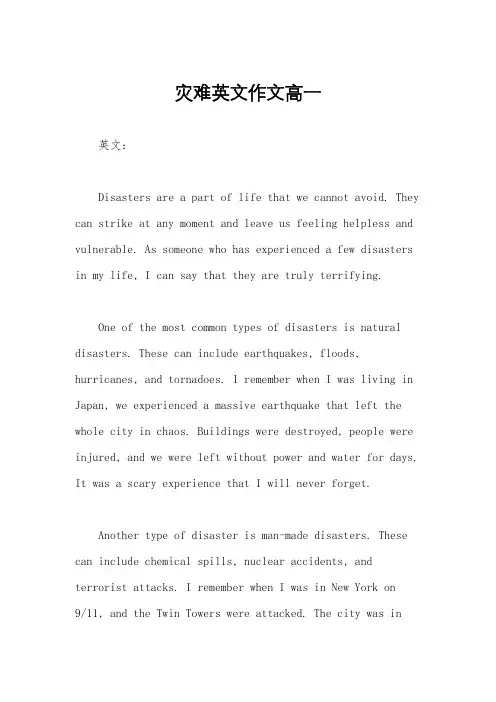
灾难英文作文高一英文:Disasters are a part of life that we cannot avoid. They can strike at any moment and leave us feeling helpless and vulnerable. As someone who has experienced a few disasters in my life, I can say that they are truly terrifying.One of the most common types of disasters is natural disasters. These can include earthquakes, floods, hurricanes, and tornadoes. I remember when I was living in Japan, we experienced a massive earthquake that left the whole city in chaos. Buildings were destroyed, people were injured, and we were left without power and water for days. It was a scary experience that I will never forget.Another type of disaster is man-made disasters. These can include chemical spills, nuclear accidents, andterrorist attacks. I remember when I was in New York on9/11, and the Twin Towers were attacked. The city was inchaos, and everyone was trying to find a way to safety. It was a horrific experience that changed my life forever.In times of disaster, it is important to stay calm and follow the instructions of authorities. It is also important to have a plan in place for emergencies and to have emergency supplies on hand. These supplies can include food, water, first aid kits, and flashlights.中文:灾难是生活中不可避免的一部分。
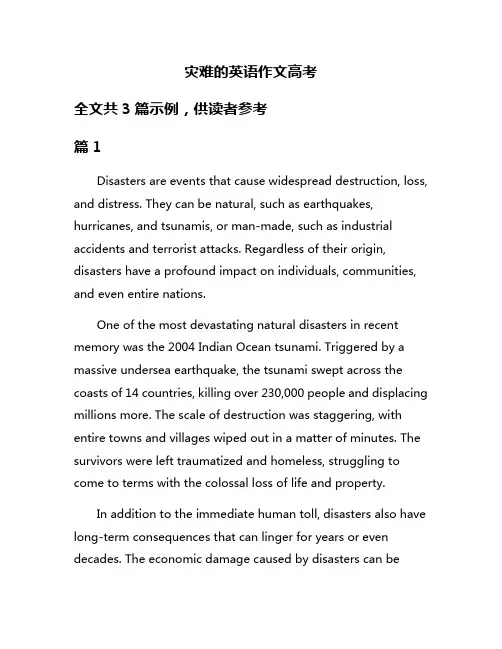
灾难的英语作文高考全文共3篇示例,供读者参考篇1Disasters are events that cause widespread destruction, loss, and distress. They can be natural, such as earthquakes, hurricanes, and tsunamis, or man-made, such as industrial accidents and terrorist attacks. Regardless of their origin, disasters have a profound impact on individuals, communities, and even entire nations.One of the most devastating natural disasters in recent memory was the 2004 Indian Ocean tsunami. Triggered by a massive undersea earthquake, the tsunami swept across the coasts of 14 countries, killing over 230,000 people and displacing millions more. The scale of destruction was staggering, with entire towns and villages wiped out in a matter of minutes. The survivors were left traumatized and homeless, struggling to come to terms with the colossal loss of life and property.In addition to the immediate human toll, disasters also have long-term consequences that can linger for years or even decades. The economic damage caused by disasters can beenormous, with infrastructure, agriculture, and businesses all suffering significant losses. The social fabric of affected communities can also be torn apart, as families are separated, homes are destroyed, and essential services are disrupted. The psychological impact of disasters is also profound, with survivors experiencing high levels of stress, anxiety, and depression.Despite the widespread devastation caused by disasters, there is hope in the form of disaster preparedness and response. Governments, organizations, and individuals can take proactive measures to mitigate the impact of disasters and save lives. Early warning systems, evacuation plans, and emergency supplies can all help to reduce the risk of harm and improve the resilience of communities in the face of disasters. In the aftermath of a disaster, rapid humanitarian aid and support can make a crucial difference in helping people to recover and rebuild their lives.In conclusion, disasters are a harsh reminder of the fragility of human existence and the power of nature. While we cannot prevent disasters from occurring, we can take steps to minimize their impact and support those affected by them. By working together and showing compassion and solidarity in times of crisis, we can overcome the challenges posed by disasters and emerge stronger and more resilient than before.篇2Disasters are unexpected events that cause widespread destruction and hardship. They can be natural, such as earthquakes, hurricanes, floods, or wildfires, or man-made, such as industrial accidents or terrorist attacks. Regardless of their origin, disasters can have devastating consequences on human lives, communities, and economies.One of the most common natural disasters is earthquakes. These sudden and violent shaking of the ground can cause buildings to collapse, roads to crack, and landslides to occur. The destruction caused by earthquakes can be massive, leaving behind a trail of destruction and death. In 2010, a powerful earthquake struck Haiti, killing over 200,000 people and displacing millions more. The country is still recovering from the aftermath of this disaster.Another common natural disaster is hurricanes. These powerful storms can unleash strong winds, heavy rains, and storm surges that can inundate coastal areas. In 2005, Hurricane Katrina devastated the Gulf Coast of the United States, causing over 1,800 deaths and billions of dollars in damages. The impact of this disaster was felt for years to come, as many homes andbusinesses were destroyed, and thousands of people were displaced.Floods are also a common natural disaster that can have devastating effects on communities. Heavy rainfall, overflowing rivers, or tsunamis can cause widespread flooding, destroying homes, crops, and infrastructure. In 2019, Cyclone Idai struck Mozambique, causing massive flooding and leaving hundreds dead and thousands homeless. The country is still struggling to recover from this disaster.Wildfires are another natural disaster that can have catastrophic consequences. These uncontrollable fires can destroy forests, homes, and wildlife, leading to the loss of lives and livelihoods. In 2020, wildfires ravaged Australia, burning millions of acres of land, killing billions of animals, and displacing thousands of people. The country is still grappling with the aftermath of this disaster.Man-made disasters, such as industrial accidents or terrorist attacks, can also have devastating effects on communities. The explosion of the Chernobyl nuclear power plant in 1986 caused widespread radiation contamination, leading to long-term health consequences for the surrounding population. The 9/11terrorist attacks in 2001 killed thousands of people and forever changed the landscape of the United States.In conclusion, disasters are events that can have profound and lasting impacts on human lives and communities. Whether natural or man-made, these events can cause widespread destruction, death, and hardship. It is essential for governments, organizations, and individuals to be prepared for disasters and to work together to mitigate their impact and help affected communities recover and rebuild. Only by working together can we effectively respond to and recover from disasters.篇3Disasters can strike at any moment, causing widespread destruction and devastation. From natural disasters like earthquakes, tsunamis, and hurricanes to man-made disasters such as industrial accidents and terrorist attacks, the impact of these events can be overwhelming. In this essay, we will explore the various types of disasters, their causes, and the ways in which individuals and communities can prepare for and respond to these emergencies.Natural disasters are events that result from natural processes, such as earthquakes, floods, wildfires, and hurricanes.These events can cause widespread damage to infrastructure, homes, and the environment, resulting in loss of life and displacement of populations. The causes of natural disasters vary, but they are often the result of geological processes, climate change, or weather patterns. For example, earthquakes are caused by the movement of tectonic plates, while hurricanes are fueled by warm ocean waters and atmospheric conditions.Man-made disasters, on the other hand, are events that result from human activities, such as industrial accidents, oil spills, and terrorist attacks. These events can have far-reaching consequences, including loss of life, environmental contamination, and economic disruption. The causes ofman-made disasters vary, but they are often the result of human error, negligence, or intentional acts of violence. For example, the Deepwater Horizon oil spill in 2010 was caused by a series of equipment failures and mismanagement, resulting in one of the largest environmental disasters in history.In order to prepare for and respond to disasters, individuals and communities must take proactive measures to mitigate the impact of these events. This includes developing emergency plans, stocking up on supplies, and staying informed about potential threats. For natural disasters, this may involve securinghomes and buildings, creating evacuation routes, and establishing communication systems. For man-made disasters, this may involve implementing safety protocols, conducting drills, and working with local authorities to address potential risks.In addition to preparation, response and recovery efforts are also critical in the wake of a disaster. This may involve search and rescue operations, medical assistance, and distribution of aid to affected populations. Communities must work together to address immediate needs and ensure the long-term recovery of those impacted by the disaster. This may involve rebuilding infrastructure, restoring essential services, and providing support to those in need.Overall, disasters are a sobering reminder of the fragility of human existence and the power of nature. While we may not be able to prevent these events from occurring, we can take steps to minimize their impact and build resilience in the face of adversity. By working together and supporting one another, we can overcome the challenges posed by disasters and emerge stronger and more united as a result.。
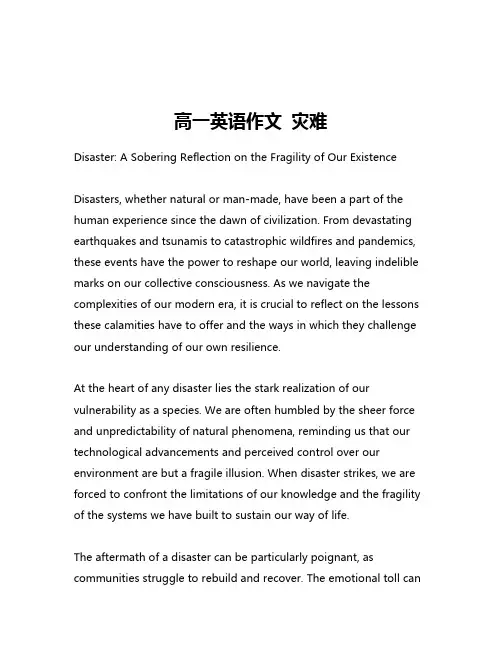
高一英语作文灾难Disaster: A Sobering Reflection on the Fragility of Our ExistenceDisasters, whether natural or man-made, have been a part of the human experience since the dawn of civilization. From devastating earthquakes and tsunamis to catastrophic wildfires and pandemics, these events have the power to reshape our world, leaving indelible marks on our collective consciousness. As we navigate the complexities of our modern era, it is crucial to reflect on the lessons these calamities have to offer and the ways in which they challenge our understanding of our own resilience.At the heart of any disaster lies the stark realization of our vulnerability as a species. We are often humbled by the sheer force and unpredictability of natural phenomena, reminding us that our technological advancements and perceived control over our environment are but a fragile illusion. When disaster strikes, we are forced to confront the limitations of our knowledge and the fragility of the systems we have built to sustain our way of life.The aftermath of a disaster can be particularly poignant, as communities struggle to rebuild and recover. The emotional toll canbe devastating, with families torn apart, homes and livelihoods destroyed, and a deep sense of uncertainty and loss permeating the air. In these moments, we are reminded of the importance of empathy, compassion, and the fundamental human need for connection and support.Yet, amidst the darkness, there often emerges a glimmer of hope – a testament to the resilience of the human spirit. Time and again, we have witnessed communities band together, drawing strength from one another and finding the courage to rise from the ashes. The stories of heroism, selflessness, and the triumph of the human will in the face of adversity are a testament to our capacity for resilience and our unwavering determination to overcome even the most daunting challenges.As we reflect on the lessons of disasters, it becomes clear that they hold the power to transform us, both individually and as a society. They force us to confront our own mortality, to reevaluate our priorities, and to recognize the fragility of the systems we have built. In doing so, they challenge us to become more resilient, more compassionate, and more vigilant in our efforts to mitigate the risks and prepare for the unpredictable.In the face of disaster, we are called upon to cultivate a deeper appreciation for the preciousness of life, the importance ofcommunity, and the need to work together towards a more sustainable and resilient future. By embracing this perspective, we can begin to transform the way we approach the challenges that lie ahead, drawing strength from the lessons of the past and using them to build a more resilient and compassionate world.。
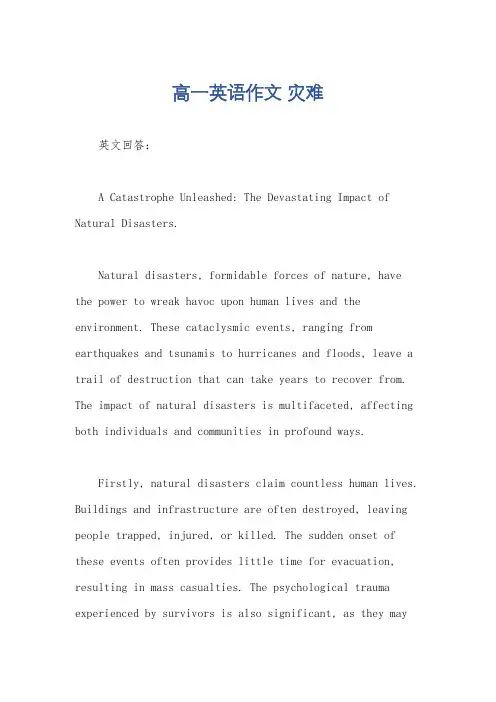
高一英语作文灾难英文回答:A Catastrophe Unleashed: The Devastating Impact of Natural Disasters.Natural disasters, formidable forces of nature, have the power to wreak havoc upon human lives and the environment. These cataclysmic events, ranging from earthquakes and tsunamis to hurricanes and floods, leave a trail of destruction that can take years to recover from. The impact of natural disasters is multifaceted, affecting both individuals and communities in profound ways.Firstly, natural disasters claim countless human lives. Buildings and infrastructure are often destroyed, leaving people trapped, injured, or killed. The sudden onset of these events often provides little time for evacuation, resulting in mass casualties. The psychological trauma experienced by survivors is also significant, as they maywitness the loss of loved ones, their homes, and theirsense of security.Secondly, the economic consequences of naturaldisasters can be staggering. Businesses and industries are disrupted, leading to unemployment and financial losses.The cost of rebuilding damaged infrastructure and providing relief to victims can strain national and international budgets. In developing countries, where resources are already scarce, natural disasters can exacerbate povertyand inequality.Thirdly, natural disasters have a profoundenvironmental impact. Forests, ecosystems, and wildlife habitats can be destroyed, disrupting the balance of nature. The release of toxic chemicals or pollutants duringindustrial accidents can further contaminate the environment, posing risks to human health and ecosystems.In light of this catastrophic impact, it is imperativeto enhance our preparedness and resilience measures. Early warning systems and evacuation plans can save lives byproviding timely alerts and safe escape routes. Building codes and zoning regulations should be enforced to ensure that structures can withstand natural hazards. Investing in disaster risk reduction and management is crucial for mitigating the impacts of these events.International cooperation is also essential in addressing the global threat posed by natural disasters. Sharing knowledge, resources, and best practices can help vulnerable communities become more resilient. Providing financial assistance and technical expertise to developing countries can enable them to cope with and recover from these devastating events.中文回答:灾难来袭,自然灾害的毁灭性影响。
新人教版关于自然灾难的高考英语作文全文共6篇示例,供读者参考篇1Natural Disasters are Really Scary!Hi, my name is Liam and I'm 10 years old. Today I want to tell you all about natural disasters because they are really frightening but also really fascinating. Natural disasters are things like earthquakes, hurricanes, volcanoes erupting, tsunamis, and wildfires that happen in nature and can cause a huge amount of damage and destruction.Let me start by talking about earthquakes since they are one of the scariest natural disasters in my opinion. Earthquakes happen when the tectonic plates under the earth's surface suddenly shift and move. This releases a huge amount of energy that travels through the ground as seismic waves, causing the shaking that we feel during an earthquake. The bigger the earthquake, the more intense the shaking will be.Earthquakes can bring down whole buildings and bridges in just a few seconds! They can make roads and Railways crack open. Gas lines and water pipes can rupture and start leaking orexploding. After a really big earthquake, there are often fires breaking out all over the place from the broken gas lines. Earthquakes can trigger mudslides and avalanches too by loosening up the soil and snow on hills and mountains.I remember learning about the 2011 earthquake and tsunami that hit Japan. That was absolutely terrifying! First there was a massive 9.0 magnitude earthquake miles out in the Pacific Ocean. Then it triggered a series of gigantic tsunami waves that swept over the coastlines of northern Japan. Whole towns and cities were completely wiped out by those tsunami waves which were as high as 133 feet (40 meters) in some places! Almost 16,000 people died and it caused a nuclear accident at the Fukushima power plant too. Natural disasters often cause knock-on effects that make them even more catastrophic.Hurricanes are another super scary type of natural disaster. Hurricanes are giant rotating storms with extremely high speed winds that form over warm ocean waters. The winds in a major hurricane can reach over 150 mph (240 km/h)! Those winds are powerful enough to rip roofs off houses, knock over trees, and send debris like pieces of wood and metal flying around dangerously.Hurricanes also cause immense flooding rainfall and storm surges that can inundate coastal areas. In 2017, Hurricane Harvey dropped over 60 inches (150 cm) of rain in parts of Texas, leading to widespread flooding that submerged tens of thousands of homes and caused about 90 billion in damage. Last year, Hurricane Ian caused a 10-foot storm surge that flooded communities along the southwest Florida coast. The flooding is often the most destructive part of hurricanes.Wildfires are another terrifying natural disaster, especially here in the western United States where I live. Wildfires happen when dry vegetation like trees, bushes, and grasses catch on fire and the flames spread rapidly over a large area, often aided by hot, windy conditions. Wildfires can start from naturally occurring causes like lightning strikes, or from human causes like campfires or downed power lines.Once a major wildfire gets going, it can be incredibly difficult to control or extinguish. The fires move so fast that people often have to evacuate their homes with little notice. Wildfires can burn down whole neighborhoods and even entire towns, leaving smoldering ruins behind. The smoke from wildfires makes the air incredibly polluted and unhealthy to breathe too.In 2018, the Camp Fire destroyed almost 19,000 buildings and killed 85 people, making it one of the deadliest wildfires in California history. In 2020, over 4 million acres burned in California in what was the largest wildfire season ever recorded. Wildfires are getting worse due to climate change causing hotter, drier conditions in many areas.Volcanic eruptions are another crazy impressive but scary natural phenomenon. Volcanoes are basically hugemountain-like vents in the earth's surface where molten rock from deep inside the planet can erupt out in explosive fashion. When a volcano erupts, it can spew out massive clouds of ash and smoke up to 20 miles high! It rains down ash that can bury entire towns.The lava flows from erupting volcanoes are incredibly destructive too, burning and burying everything in their path. They move slowly enough that people can usually get away, but trying to stop a lava flow is virtually impossible. In 2018, the Kilauea volcano in Hawaii erupted for 3 months, destroying over 700 homes and forcing thousands to evacuate.But volcanic eruptions can cause other dangers beyond just the lava and ash. Mudflows, wildfire, tsunamis, and toxic gases are all possible deadly hazards caused by big volcanic blasts. The1980 eruption of Mount St. Helens in Washington state releaseda powerful lateral air blast that flattened millions of trees up to17 miles away! It also triggered the worst volcanic mudflow ever recorded.So as you can see, natural disasters like earthquakes, hurricanes, wildfires, and volcanic eruptions are immensely powerful and destructive forces of nature that we have to be prepared for. Tsunamis, floods, landslides, and avalanches are other major natural disasters too. While they are terrifying, it's also incredible to learn about the science behind how these natural phenomena occur.We can't stop natural disasters from happening, but we can study them closely and work on better ways to predict them, prepare communities, and protect lives and property. Things like tsunami warning systems, improved building codes, better firefighting techniques, and careful community planning in hazardous areas can all help reduce the catastrophic impacts.I know learning about all these natural disasters might sound scary, but the more we understand them, the better we can keep ourselves safe. We just have to respect the immense power of nature and be ready when disaster strikes. I'll leave you with one last terrifying but true fact - volcanic eruptions are responsiblefor causing some of the worst mass extinction events in earth's history when they filled the atmosphere with sun-blocking ash and gases! Crazy stuff, right? Thanks for reading, stay safe out there!篇2Certainly! Here is a 2000 word high school English essay on natural disasters, written from the perspective of a young student in simple English:Natural Disasters Are Really ScaryHi, my name is Timmy and I'm going to tell you about natural disasters. Natural disasters are really scary events that can cause a lot of damage and hurt many people. They happen because of nature, not because of humans. Some examples are earthquakes, tsunamis, hurricanes, tornadoes, floods, and wildfires.Earthquakes are when the ground suddenly starts shaking really hard. This is caused by movements of the tectonic plates that make up the Earth's surface. Earthquakes can make buildings collapse and kill many people if they are very strong. After an earthquake happens, there can also be dangerous fires and problems getting food, water and shelter.Tsunamis are giant waves in the ocean that come from underwater earthquakes or volcanoes. A tsunami wave can be as tall as a huge building when it hits the shore. It can wash away houses, cars, trees and anything else in its path. People need to run to higher ground right away if they are warned a tsunami is coming.Hurricanes are massive rotating storms with very strong winds and heavy rains. They form over warm ocean waters. The winds from a hurricane can flatten houses and buildings. The rains cause lots of flooding too. Hurricanes can be the size of a whole state! People have to evacuate the area when a major hurricane is predicted to hit their town.Tornadoes are funnel-shaped clouds that spin very fast in a circular motion. They contain extremely powerful winds that can destroy pretty much anything they hit. Tornadoes come from thunderstorms. If a tornado warning is announced, people have to quickly go take shelter in a basement or storm cellar until it passes over.Floods happen when too much water overflows onto normally dry land. This can occur from heavy rains, when a river rises too high, or if a dam breaks. Floods can trap people in theirhomes and make the roads impassable. The waters can carry away cars and submerge buildings with water damage.Wildfires are huge fires that burn through forests, grasslands or brushy areas. They often start from lightning strikes but can also begin from human causes. Wildfires driven by strong winds can move extremely fast and consume everything in their path - houses, trees, wildlife habitats. Evacuations have to happen swiftly when a major wildfire is approaching.As you can see, natural disasters can be tremendously destructive events. They make me feel scared when I learn about how powerful they can be. Whole cities and towns can be ruined, and many lives are tragically lost. But emergency responders like firefighters, police, the National Guard and aid groups help a lot by evacuating people to safety and providing relief supplies afterward. Scientists also work hard to better predict these events so people can be better prepared.I hope natural disasters like these don't happen too often. But when they do, it's important that everyone remains calm, follows official instructions, and helps out however they can. Staying informed about the risks and having emergency plans and supply kits at home can make a big difference too. Please besafe out there everyone! The forces of nature are nothing to mess around with.篇3Natural Disasters Are Really Scary!Hi, my name is Lily and I'm going to tell you all about natural disasters. Natural disasters are really big emergencies that are caused by nature, like hurricanes, earthquakes, tornadoes and stuff like that. They can be super duper scary and cause a lot of damage and hurt people. But don't worry, I'll explain what they are so you can learn about them.First up, let's talk about hurricanes. Hurricanes are massive storm systems that form over warm ocean water. They spin around really fast in a circle and have an intense spiral of clouds and thunderstorms. The winds can be incredibly strong, over 150 mph sometimes! That's insanely fast. Hurricanes also bring intense rain, flooding, and storm surges that crash into coastlines.I remember when Hurricane Maria hit Puerto Rico in 2017. It was one of the worst hurricanes ever and caused catastrophic damage. The winds ripped off roofs, broke windows, and knocked down trees and power lines everywhere. The floodingwas terrible too and pretty much the whole island lost electricity for months. So many people's homes were destroyed. It was just awful.Earthquakes are another super scary natural disaster. An earthquake happens when there is shaking and movement of the earth's tectonic plates under the ground. The shaking can be really violent and powerful, knocking over buildings and bridges. It opens up cracks in the ground too. The biggest earthquakes everare around 9.0 in magnitude which is unimaginably huge!I saw videos of the 2011 earthquake in Japan that triggered a massive tsunami too. First there was intense shaking for like 5 minutes straight which made buildings sway back and forth alarmingly. Then these enormous tsunami waves over 100 feet tall came crashing into the coastline, sweeping away cars, homes, and anything in their path. It looked like a scene from a monster movie. Over 15,000 people died which is just heartbreaking.Tornadoes might be the most terrifying natural disaster of all in my opinion. A tornado is a violently rotating column of air that extends from a thunderstorm and touches the ground. They can be over a mile wide but are usually much smaller. Still, the winds can reach over 300 mph which is ridiculously fast! Tornadoesplow through anything in their path, ripping buildings apart like they were made of toothpicks.I remember watching footage of the 2013 tornado in Moore, Oklahoma. You could see this massive black funnel cloud churning across the landscape, flinging debris everywhere. Entire neighborhoods got obliterated, with only scraps of wood and insulation left on the ground. Tornadoes move surprisingly fast too which makes them very hard to escape. They are honestly terrifying acts of nature.Other natural disasters that are scary include wildfires, droughts, heatwaves, blizzards, avalanches, and volcanoes erupting. Basically any extreme weather or geological event can be hugely disruptive and harmful. Scientists think climate change is making some types of natural disasters even worse too.While natural disasters seem really frightening, it's good to know that there are ways to stay safe. Having emergency plans, disaster kits, shelters, and good warning systems all help a lot. Scientists are working super hard on better predictions too so people can get prepared.I know learning about all these terrible natural disasters probably seems really scary. ButI think the more we understand about them, the better we can handle them when they strike. Wejust have to be ready and not panic. Hopefully, I've helped explain what some of the major natural disasters are. Just remember to listen to emergency personnel and get to a safe place if one ever happens near you. Stay safe out there, friends!篇4Natural Disasters Are Really Scary!Hi there! My name is Timmy and I'm 10 years old. Today I want to tell you all about natural disasters because they are really scary and dangerous things. My teacher says a natural disaster is when the weather or the earth itself causes a lot of damage and puts many people in danger.Let me start by talking about earthquakes. These happen when the ground suddenly starts shaking because of movements deep underground. The shaking can be gentle at first, but it can quickly grow stronger and more violent. Buildings can get cracked or even collapse entirely during big quakes. I've never been in a real earthquake before, but we did an earthquake drill at school where we had to hide under our desks. Even that was kind of frightening imagining what a real quake would be like.Earthquakes can also cause other disasters like tsunamis. A tsunami is a huge wave in the ocean that happens after theshaking of a quake displaces tons of water. The wave can grow to be absolutely massive - as tall as a skyscraper! When it reaches land, a tsunami can flood entire cities and towns. On TV, I've seen videos of tsunamis just demolishing everything in their path. It makes me want to live really far away from any oceans.Another terrifying natural disaster is volcanoes. These are basically mountains that can erupt and spew out scorching hot lava, rocks, ash, and poisonous gases. The lava can burn everything it touches and bury whole towns under it. The ash can make it hard to breathe and block out the sun for miles around. Some volcanoes can even blast out huge pieces of rock bigger than a truck! I would not want to be anywhere near an erupting volcano.Hurricanes are another type of natural disaster that happens over the oceans. They are giant rotating storms with incredible wind speeds over 150 mph. The winds are strong enough to rip roofs off houses and snap trees like twigs. Hurricanes also bring intense flooding rainfall measured in feet rather than inches. Storm surges - walls of ocean water pushed ahead of the hurricane - can inundate coastal areas. I've seen terrible pictures of entire neighborhoods flattened by hurricanes or submergedin floodwaters. They leave millions without power, too. Hurricanes are no joke.Tornadoes are kind of like little spinning hurricanes, but they happen over land instead of the ocean. These violent twisters of wind can destroy everything in a path over a mile wide. Winds in the strongest tornadoes top 300 mph - that's like a fireball whizzing by! Tornadoes can hurl cars and mobile homes through the air and shred buildings into piles of debris. What's really scary is you often only get a few minutes warning or less before one strikes an area. I hope I never get caught in the path of a tornado.Although I haven't experienced any of these disasters myself, I know they cause so much devastation and suffering when they hit populated areas. Homes, businesses, and entire communities can be wiped out in an instant. Even after the initial disaster, survivors often lack basic utilities, clean water, medical care, and shelter. It can take years for some towns to recover fully and rebuild.That's why preparing for natural disasters is so important. At home, we have emergency supplies like bottled water,non-perishable food, first aid kits, flashlights and batteries. My parents also made an emergency plan with meeting places andcontacts in case we get separated. At school, they taught us safety drills - ducking under desks for earthquakes, seeking low ground for tornadoes, and shuttering windows for hurricanes.Still, even with some preparation, major natural disasters are just plain scary and heartbreaking events, especially for kids my age. All we can really do is learn about them, have a plan, and try to stay as safe as possible if one ever strikes our area. I really hope no disastrous hurricanes, tornadoes, earthquakes, tsunamis, or volcanic eruptions happen any time soon. The world can be a dangerous and unpredictable place sometimes with crazy powerful forces of nature. But as long as we stay aware and prepared, we'll be okay. Thanks for reading my essay - let's all hope for clear skies and calm days ahead!篇5Natural Disasters: A Little Kid's Big FearsHi there! My name is Tommy, and I'm a 10-year-old kid who loves playing video games, watching cartoons, and hanging out with my friends. But there's one thing that really scares me –natural disasters! I know they're called "natural," but to me, they seem like these huge, terrifying monsters that can destroy everything in their path.Let me tell you about the first time I learned about natural disasters. It was during a science lesson at school, and our teacher, Mrs. Johnson, started talking about earthquakes. She showed us pictures of buildings that had collapsed, and people who were injured or had lost their homes. I remember feeling really scared and confused. How could the ground just shake like that and cause so much damage?Then, Mrs. Johnson talked about tsunamis – those giant waves that can sweep away entire cities! She showed us a video of a tsunami hitting a town, and it was just so overwhelming. Imagine being at the beach, having篇6Natural Disasters Are Really Scary!Hi, my name is Timmy and I'm 10 years old. Today I want to tell you all about natural disasters because they are really scary things that can hurt a lot of people and mess up whole towns and cities.First, let me tell you about hurricanes. Hurricanes are like really, really strong storms that come from over the ocean. They have crazy powerful winds that can knockover trees and blow the roofs off houses and buildings. The winds can be over 150 mph -that's like a really fast racecar! Hurricanes also bring huge amounts of rain that causes major flooding. All that wind and rain from a hurricane can destroy homes and businesses and leave millions of people without power for weeks or months. It's such a big mess to clean up after a bad hurricane.I remember a few years ago when Hurricane Maria hit Puerto Rico. That was one of the worst and strongest hurricanes ever recorded. The entire island lost electricity and it took almost a year to get the power back on everywhere. So many homes and roads were damaged by the powerful winds and floods. People couldn't go to school or work because there was no power or running water. It was really bad. We had to send lots of supplies like food, water, medicine and generators to help everyone on the island. Natural disasters like that are no joke!Earthquakes are another terrifying natural disaster. An earthquake happens when there is shaking or trembling of the ground, sometimes gently but often violently. Earthquakes are caused by the movement of the earth's tectonic plates under the surface. When those huge plates suddenly shift position, it releases massive amounts of energy that causes intense shaking aboveground. That shaking can make buildings collapse and roads crack apart. It's absolutely terrifying when an earthquakehits because you don't know how bad it will get or if your home will stay standing.In 2011, there was a massive 9.0 earthquake off the coast of Japan that triggered a deadly tsunami too. The shaking from that quake was felt as far away as Russia! It caused a ton of damage and even made problems at a few nuclear power plants in Japan. Thousands of people sadly lost their lives from the earthquake itself and the huge tsunami waves it sent crashing into coastal areas. Natural disasters like big earthquakes and tsunamis remind us how small we are compared to the powerful forces of nature sometimes.Wildfires are another type of natural disaster that can be really destructive. Of course, fires need three things to burn: heat, fuel and oxygen. A lot of wildfires are caused by lightning strikes or human carelessness like leaving campfires unattended. Once a wildfire gets going, those flames can spread rapidly across dry brush and forests, especially if there are strong winds pushing it along. Wildfires move extremely fast and can trap people and animals in their paths. They fill the air with thick, choking smoke that makes it hard to breathe. And the intense heat gives off can burn everything in its way to the ground.Just last year, the Caldor Fire burned for over two months across remote areas of California and even reached the city limits of towns, forcing thousands to evacuate. Fire crews battled that blaze for ages before finally containingit, but not before it scorched over 220,000 acres of land and destroyed over 1,000 buildings and homes. You really have to listen to evacuation orders when wildfires get bad because they can overcome you so fast.Tornadoes might just be the most frightening natural disaster of all! A tornado is a funnel-shaped rotating column of air that extends from a storm cloud down towards the ground. They can happen with almost no warning at all and tear through an area at blistering speeds over 300 mph! Just picture a powerful vacuum cleaner sucking up everything in its path - that's basically what a tornado does. One second everything is normal, the next second an entire neighborhood has been flattened by tornado's monstrous winds.I remember watching videos of the devastating tornado that ripped through Joplin, Missouri in 2011. One third of that whole city was completely destroyed within a half hour as the tornado tossed cars through the air like toys and ripped apart homes and businesses. It was just total chaos and over 150 people tragicallylost their lives from that one tornado alone. You have to take tornado warnings very seriously and get underground to a basement or shelter if one is headed your way. Tornadoes are no joke!Dealing with the aftermath of natural disasters is always really hard too. Homes and businesses need repaired or totally rebuilt. Roads and bridges have to be fixed. Electricity, water and other utilities have to be restored. And people are often left homeless or injured in the wake of these terrible events. The cleanup and recovery can take months or years in many cases. That's why it's so important for everyone to be prepared with emergency kits and plans for evacuating if needed.I really hope I never have to experience a mega natural disaster myself. Just learning about hurricanes, earthquakes, wildfires, tornadoes and other extreme weather events shows how destructive and life-threatening they can truly be. We need to have a healthy respect for the awesome power of nature because it can be pretty scary stuff! I'll definitely be studying up on emergency preparedness so I know what to do. Natural disasters are no laughing matter, that's for sure.Thanks for reading my essay about these frightening natural disasters. Stay safe out there, because you never know when thenext big one could strike your area. The forces of nature are incredibly powerful! Make sure you have a plan and are ready to take action if disaster ever heads your way.。
有关灾难的英语作文高中英文回答:A deafening roar shattered the tranquility of the night, ripping through the air like a banshee's wail. The ground beneath my feet trembled violently, as if the earth was a beast convulsing in pain. I watched in horror as buildings swayed and collapsed, casting thick clouds of dust and debris into the air.In the midst of the chaos, I found myself thrown from my slumber, disoriented and terrified. As I stumbled out of my crumbling apartment, a scene of utter devastation unfolded before my eyes. The once-familiar streets were unrecognizable, strewn with twisted metal, shattered glass, and the remnants of countless lives.The air was filled with the cries of the injured and the pungent smell of smoke. I could hear the distant wail of sirens, their piercing notes a beacon of hope and despair. Everywhere I looked, there was suffering and destruction.Fear gnawed at my heart as I frantically searched for my loved ones. I called out their names, but my voice was drowned out by the incessant roar of the disaster. Desperation clawed at me as I realized the true extent of the catastrophe.In the face of such adversity, I struggled to find meaning. Why had this tragedy befallen our city? Why had we been subjected to such unspeakable suffering? Questions swirled in my mind, unanswered and haunting.As the night wore on, I stumbled upon a makeshift shelter where survivors had gathered. There, I found solace in the shared stories of loss and resilience. We offered each other comfort, knowing that we were not alone in our grief.Amidst the ruins, I discovered a glimmer of hope. People from all walks of life came together, united by a commonpurpose: to help and heal. Strangers risked their own lives to rescue others, and neighbors shared their meager supplies with those in need.In the aftermath of the disaster, our community was changed forever. The bonds that had once connected us were forged even stronger through adversity. We had lost much, but we had also gained an unbreakable spirit of resilience and compassion.As the sun rose on a new day, I emerged from the wreckage with a heavy heart but an unwavering resolve. I knew that the road to recovery would be long and arduous, but I was determined to rebuild my life and my community.From the ashes of the disaster, a new spirit emerged—a spirit of unity, hope, and unyielding determination. We would not let this tragedy define us. We would overcome adversity and emerge stronger than before.中文回答:一声震耳欲聋的巨响打破了宁静的夜晚,如女妖的哀嚎划破长空。
The Impact of Earthquakes on Our Lives: AHigh School PerspectiveEarthquakes, a natural disaster that has the potential to shake the very foundation of our world, can strike without warning, leaving in its wake destruction, chaos, and heartache. As high school students, it's important for us to understand the impact of earthquakes and how to prepare for them, so that we can respond effectively in the event of such a disaster.The first and foremost impact of earthquakes is the physical damage they cause. Buildings, bridges, roads, and other infrastructure can collapse or become unstable, leaving communities in shambles. This not only disrupts daily life but also poses a serious threat to the safety of residents. Schools, which are often the heart of a community, can be severely damaged, affecting the educational process and the well-being of students.Moreover, earthquakes can have a profound psychological impact on individuals and communities. The fear and uncertainty that accompany such a disaster can lead to stress, anxiety, and even post-traumatic stress disorder(PTSD). It's important for us to recognize these emotional responses and provide support and counseling to those affected.As high school students, we can play a crucial role in earthquake preparedness and response. We can learn about earthquake safety measures, such as "drop, cover, and hold on" during an earthquake, and practice these drills in school and at home. We can also help spread awareness about earthquake preparedness among our families, friends, and community members.Additionally, we can participate in志愿者活动 such as helping to build earthquake-resistant structures in our communities or assisting in relief efforts after an earthquake. By getting involved, we can make a difference in the lives of those affected and help our communities become more resilient in the face of natural disasters.In conclusion, earthquakes are a real and present danger that can have devastating impacts on our lives. As high school students, it's our responsibility to understand the risks and prepare ourselves and our communities for such disasters. By taking action and getting involved, wecan help mitigate the impact of earthquakes and build a safer, stronger world.**地震灾难对我们生活的影响:高中生的视角**地震,这种能够动摇我们世界根基的自然灾害,可能会在没有预警的情况下发生,留下破坏、混乱和悲伤。
有关灾难英文作文高中作文英文:Disasters are events that can cause widespread destruction and devastation, such as natural disasters like earthquakes, hurricanes, and floods, or human-madedisasters like terrorist attacks or industrial accidents. These events can have a profound impact on individuals, communities, and even entire countries. 。
I remember when my hometown was hit by a devastating flood a few years ago. The heavy rainfall caused the riverto overflow, and the water quickly rose, engulfing homesand businesses. Many people lost their homes, belongings, and even loved ones. It was a truly heartbreaking andchaotic time for everyone in the community.In the aftermath of the flood, I witnessed theincredible resilience and strength of the people in my town. Neighbors came together to help each other clean up andrebuild. Organizations and volunteers from all over the country came to provide support and assistance. It was amazing to see how everyone rallied together in the face of such a disaster.中文:灾难是一种可能造成广泛破坏和毁灭的事件,如地震、飓风和洪水等自然灾害,或者恐怖袭击或工业事故等人为灾害。
大学生灾难英语作文高中英文回答:As a university student, I have a responsibility to be prepared for any disaster that may strike. This includes knowing what to do in the event of a fire, earthquake, or other natural disaster. It also means having a plan in place for how I will communicate with my family and friends in the event of an emergency.One of the most important things I can do to preparefor a disaster is to make sure I have an emergency preparedness kit. This kit should include essential items such as first aid supplies, food, water, and a battery-powered radio. I should also keep a list of important contact information in my kit, such as the phone numbers of my family, friends, and doctor.Another important step I can take is to learn about the specific risks that I face in my area. For example, if Ilive in an earthquake-prone area, I should know what to do in the event of an earthquake. I should also be familiar with the evacuation routes in my community.Finally, I should make sure to have a plan for how I will communicate with my family and friends in the event of an emergency. This plan should include a designated meeting place and a way to communicate if phone lines are down.By following these steps, I can help to ensure my safety in the event of a disaster.中文回答:作为一名大学生,我有责任为可能发生的任何灾难做好准备。
有关灾难英文作文高中英文:Natural disasters are a common occurrence in our world. They can strike at any time, and their impact can be devastating. As someone who has experienced the effects of a natural disaster firsthand, I can say that it is a traumatic experience that can take a long time to recover from.One of the most common natural disasters is an earthquake. I remember when I was living in Japan, we had a big earthquake that shook the entire city. It was a scary experience, and I felt like the ground was going to swallow me up. The earthquake caused a lot of damage to buildings and infrastructure, and it took a long time for the city to recover.Another type of natural disaster is a hurricane. I have never experienced a hurricane myself, but I have seen thedevastation that they can cause. Hurricane Katrina, for example, caused massive flooding and destruction in New Orleans. It was a tragedy that affected thousands of people and took years to recover from.In the face of a natural disaster, it is important to come together as a community and support one another. This can be through donating money or supplies, volunteering to help with cleanup and recovery efforts, or simply offeringa listening ear to those who have been affected.中文:自然灾害在我们的世界中是常见的。
关于灾难的高中英语作文
导读:本文关于灾难的高中英语作文,仅供参考,如果觉得很不错,欢迎点评和分享。
题目要求:
Directions: Write a composition entitled On Disasters. You should write at least 120 words according to the outline given below in Chinese:
1. 人的一生中,可能会遇到一些灾难事件,给我们的生活带来意外的打击。
2. 面对灾难,我们应该坚强,不要过于沉湎于悲痛,要积极面对人生。
3. 我的看法。
参考范文:
Sample:
On Disasters
An old saying goes: Life is full of roses and thorns. As we all know, one’s life is full of unexpected events, some of which are wonderful and some of which are disastrous. Those heavy blows, such as, floods, snowstorms, and earthquakes, threaten to weigh one down.
However、it’s even worse if one can’t drag himself out of the grief in that mental break-down is more serious than the disaster itself. Instead of indulging oneself in sadness, one should take positive attitude towards life and contribute to the reconstruction of his or her life and hometown.
As for me, if I am lucky enough to survive in a disaster, I will try my best to help those who are suffering by donation blood or money. If I am a victim, I will
endeavor to recover from the sadness as soon as possible and be certain to be strong and supportive to the recovery work.
灾难的英语作文二
What a disaster(灾难)!So far,it's reported that more than 60,000 people died in the SiChuan earthquake.What's more, millions of people there have become homeless.And they are still in the danger of illness and other difficulties. Anyway, thanks to all the kind people, in and abroad,the situation has been changing well.But we still work hard at it,especially to build houses for those homeless people and cure the injured people.
What can we do now? Besides doing our own job well,we can donate money to them.We firmly believe that with the party and the government's strong leadership, and with the people of all nationalities throughout the country to aid,this earthquake relief will be a victory!
【译文】
灾难!到目前为止,有报道称,超过60,000人在四川地震中死亡,再加上数百万人民流离失所。
他们还活在疾病和困难的危险之中。
无论如何,感谢所有善良的人们,国内外形势已经改变。
但是我们仍然在努力工作的,特别是为那些无家可归的人建造房屋和为受伤的人们提供医治。
现在我们可以做什么?除了做好自己的工作做好,我们可以捐钱给他们。
我们坚信,有党和政府的坚强领导,有全国各族人民的援助,这将是一个抗震救灾的胜利!。